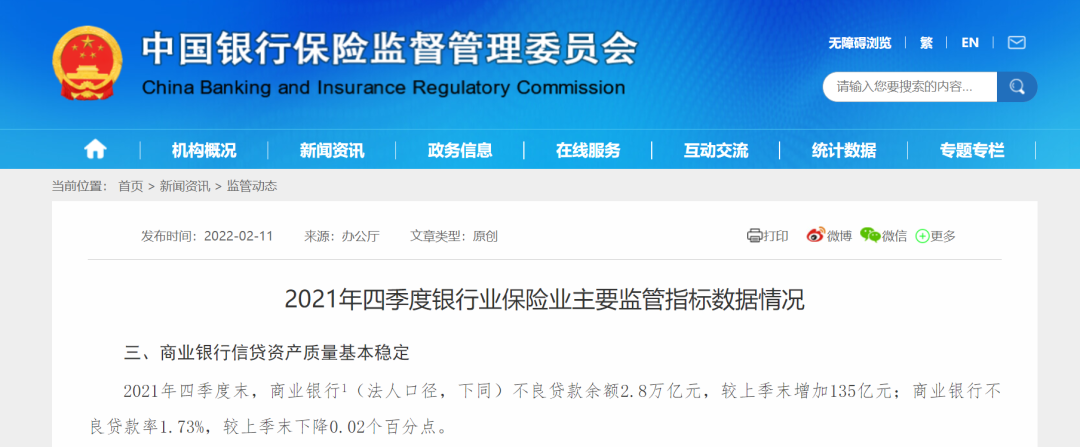On February 8, 2022, the People’s Bank of China and China Banking and Insurance Regulatory Commission held the AMC Symposium in China Orient Asset Management Co., Ltd. Chaired by Guo Shuqing, president of China Banking and Insurance Regulatory Commission, the AMC Symposium was attended by five financial and asset management companies. Relevant departments made a detailed report of the disposal of non-performing assets, mergers and reorganizations of small and medium-sized financial institutions since last year. The symposium focused on the disposal of non-performing assets of financial and asset management companies, and the intensive study of policies and measures to defuse financial market risks.
A Global Review of the NPA Industry in 2021
The year 2021 was the beginning year of the 14th Five-year Plan Period. Under the constant outbreaks of COVID-19, the Chinese economy is faced with a more complex development environment, and the financial administration focuses on preventing and resolving major risks and challenges. Asset management companies primarily engaged in non-performing asset management have also made corresponding contributions in preventing financial risks. Commercial banks have made continuous efforts to increase the disposal of non-performing assets as well. The NPL ratio of commercial banks was 1.73% at the end of the fourth quarter of 2021, down 0.02% year-on-year, according to data from the China Banking and Insurance Regulatory Commission. The total non-performing assets disposed by the banking sector in 2021 amounted to RMB 3.1 trillion, up slightly from RMB 3.02 trillion in 2020. The data indicates that assets and liabilities have grown steadily, and asset quality has maintained at a good level throughout the year of 2021.

On January 1, 2021, the “three red lines” policy of the Central Bank of China and the Ministry of Housing and Urban-Rural Development restricting developer financing was implemented across the industry. Under the new rules, property developers are unable to expand by borrowing, and an average of one property developer per month has plunged into a debt black hole over the past year. On January 7, 2021, the approval of personal to public NPL transfer and personal NPL bulk transfer became a new blue ocean in the industry in 2021. Although the problems of valuation and settlement have not been solved, the transaction size of personal loan non-performing assets is gradually expanding with more stringent regulation and business clarification. In general, the disposal of personal loan non-performing assets presents both opportunities and challenges.
On May 11, 2021, the China Banking and Insurance Regulatory Commission specified that asset management companies could participate in the disposal of trust non-performing assets, broadening the market of the NPA industry. On May 28, 2021, the China Banking and Insurance Regulatory Commission announced its plan to formulate the Interim Measures for Regulation and Administration of Local Asset Management Companies within the year. The new regulation also means that local AMC will end the chaotic business status quo, and have guidance documents in future business scope and nature of company. Moreover, the Huarong incident which was an AMC hotspot throughout 2021 also indicates that the four AMC companies must return to their main business as soon as possible, transfer their financial licenses, stay true to their original aspiration and undertake their historical mission.

Continuous Reform Advancement and Risk Defusing in 2022
Generally, the China Banking and Insurance Regulatory Commission perseveringly prevented and defused financial risks in 2021. Positive progress in bankruptcy reorganization of real estate groups was made; the transfer of personal loan non-performing assets is advancing in an orderly manner; the business process of local AMC is increasingly clarified; and the market risk of the banking industry is generally under control.
Due to the large number of small and medium-sized banks, however, the banking industry is also in a chaotic development period with declining profits and a decreasing size. It’s imperative for small and medium-sized banks to weaken the transformation impact brought by the current market through reform. In 2022, we should focus on the regional risks of small and medium-sized banks, and actively improve their risk resistance capability through merger and reorganization reform. At present, the most important way for commercial banks to dispose of non-performing assets is non-performing asset transfer, and AMC are an ideal partner for commercial banks to transfer their non-performing assets. Therefore, AMC should, on the basis of delivering satisfactory performance in its original main business, make internal improvements and optimize development strategy. AMC shall combine the unique advantages of the industry and rich experience in the disposal of bad assets, give full play to the advantages of their own resources, and supplement capital for small and medium-sized banks. Efforts should also be made to rescue high-risk small and medium-sized financial institutions, focus on debt crisis risk in real estate, carry out substantive restructuring and financial aid, and work in the front line of major financial risk management.

Finance is the core of the modern economy, and the financial risks in the post-epidemic era also affect the vital interests of the people. As the pointed out at the AMC Symposium, we should adhere to seek improvement in stability in 2022. The financial services industry should further support high quality and economic development, insist on the main line of supply-side structural reform, and steadily promote the optimization of industry structure to realize the asset-light operation of enterprises, strongly promote expansion of investment and increase of consumption, and form a virtuous circle of the national economy. Financial and asset management companies should strengthen coordination with other enterprises, stick to the correct positioning, and make new positive contributions to the transformation of the financial industry and the development of the financial market.